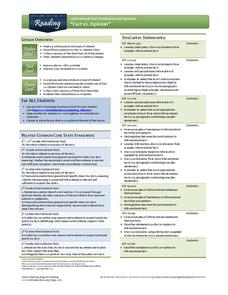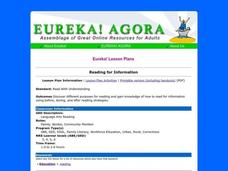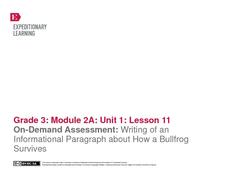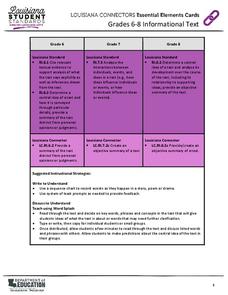For the Teachers
Fact vs. Opinion
Many informational texts are written as factual, but can your learners determine when an opinion is presented as fact? Have your kids read several articles on the same topic and record the statements that contain either facts or...
Curated OER
Reading for Information
What should readers do to prepare for reading an informational text? What should they do during their reading? What should they do after completing such a text? Introduce your pupils to reading strategies and techniques to gain meaning...
Curated OER
Comprehension: Create a Summary from an Expository Text
Children can learn to analyze expository or informational texts at nearly any age. This scaffolded and scripted resource provides teachers with the support needed to facilitate a thoughtful lesson plan on summarizing informational text...
Read Works
Signal Words in Expository Text
Signal words are one way that authors make the relationships between their ideas clear. Allow your learners the chance to investigate cause and effect in texts by identifying signal words. They locate and analyze cause-and-effect...
Scholastic
Citing Text Evidence
Could you go without your cell phone for 48 hours? Pose this question to your class and then read the article provided here. Pupils mark the text and and complete a graphic organizer that requires the use of textual evidence.
EngageNY
Synthesizing from Informational Texts: Main Idea and Key Details from Promises to Keep (Pages 8– 10)
Learners determine the main idea of a timeline on pages eight and nine of the text Promises to Keep. They use the timeline to complete a Main Idea and Details note catcher and then share their thoughts with the class. To finish,...
ReadWriteThink
"Three Stones Back": Using Informational Text to Enhance Understanding of Ball Don't Lie
"Three Stones Back," a passage from Matt de la Pena's best-seller, Ball Don't Lie, allows readers to practice their close reading skills as they compare the passage to an information text about wealth inequality.
Curated OER
Nonfiction Text Features
Identify features of a nonfiction article in this language arts lesson. Middle schoolers apply comprehension strategies as they read the parts of the article, and analyze the author's key points. Additionally, they examine information in...
Curated OER
New Information
Young readers explore informational texts as they read a text entitled Giant Pandas by Gail Gibbons. The teacher will begin by explaining that one characteristic of informational texts is that they teach the reader new information and...
Curated OER
Advertising in the Contemporary World: An Introduction to Persuasive Texts
Beginning a persuasive writing unit with your middle schoolers? Approach it through something that persuades us all: advertising! Through studying video and print advertisement, your class will practice Common Core skills for reading...
Curated OER
Information Shuffle
Gather some information, print it onto sentence strips, and then have your class physically shuffle the cards to better understand the importance of organizational patterns in writing. Middle school learners examine information for a...
Curated OER
Readings in Hudson River Natural History: Understanding Informational Text
After reading a series of informational articles regarding the Hudson River Estuary, the class will answer a series of comprehension questions. An answer key is provided but the articles and worksheets are not.
EngageNY
Grade 9 ELA Module 2, Unit 3, Lesson 5
After rereading the full text of Walter Mosley's essay "True Crime," groups complete an evidence collection tool worksheet, and then class members independently draft a multi-paragraph, evidence-based response that identifies how Mosley...
EngageNY
Grade 9 ELA Module 3, Unit 1, Lesson 6
Are cattle prods beneficial for herding cattle, or do they cause more harm than good? Investigate Temple Grandin's claim about animal behavior with a lesson that focuses on pages 20-23 of the first chapter of her book, Animals in...
EngageNY
Reading for Gist and Answering Text-Dependent Questions: Local Sustainable Food Chain
Readers use sticky notes and a Reading Closely: Guiding Questions handout to record the gist of a different section (pages 161-166) in The Omnivore’s Dilemma. They then pair up and share their ideas. To end the lesson, readers complete...
EngageNY
Finding Relevant Information and Asking Research Questions: The Benefits of Video Games
Video games may not be so bad after all. As scholars read the text "The Many Benefits, for Kids, of Playing Video Games," they summarize the gist in their researchers' notebooks. Next, pupils draft supporting research questions based on...
EngageNY
Finding Relevant Information and Asking Research Questions: The Big Thirst
Let's get to the gist. As scholars continue their study of Charles Fishman's The Big Thirst, they practice writing the gist of the text. Additionally, pupils add notes about the industrial uses of water to their researcher's notebooks.
Curated OER
Lesson Plan for Japan
The effect of cultural beliefs on the progress and industrialization of a society is an interesting idea to consider, and this is certainly true in this lesson on feudal Japan. Your young historians will read informational texts on...
EngageNY
Organizing an Opinion, Reasons, and Evidence: Text 2 for Each Expert Group
The proof is in the reading. Using the informative resource, scholars read a second article about either Althea Gibson or Roberto Clemente. As they read, they continue adding reasons and evidence to their graphic organizers to show how...
EngageNY
End of Unit 2 Assessment: Working with Two Texts - Reading, Listening, Summarizing, and Synthesizing
As a summative assessment for this unit on colonial trade, fourth graders listen to and read informational texts in order to demonstrate their ability to take notes, write summaries, and draw connections. Young scholars first listen as...
EngageNY
On-Demand Assessment: Writing of an Information Paragraph About How a Bullfrog Survives
Having read and discussed Bullfrog at Magnolia Circle, third graders demonstrate their bullfrog expertise by writing informational paragraphs. Building on the note-taking and paragraph planning from the previous lesson plan, learners...
Curated OER
American Studies
Entitled American Studies, this small unit covers various topics related to the study of the United States. Learners warm up by creating a dictionary of democracy, then dive into three different lessons focused on government, famous...
Curated OER
Worried Sick
Is health insurance a luxury? The class examine the increasing number of uninsured middle class Americans; they then research and present information on various aspects of medical coverage and care at a classroom forum entitled "The...
Louisiana Department of Education
Essential Elements Cards
Use essential elements cards to help lesson plan! Each card contains an informational text common core standard for grade levels six through eight and suggestions for activities and supports. Cards address skills such as citing textual...

























